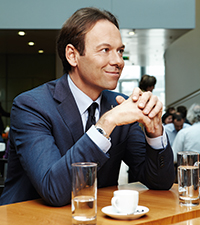Andreas Brandstetter (43) talks about initial progress in the long-term reorientation of the Group, why premature celebrations make him nervous and why others can prepare a better schnitzel.

Mr Brandstetter, this time last year you said you would have to be crazy to be satisfied with 2011 earnings. Has 2012 given you greater cause to rejoice?
Professionally, without a doubt. At the last Annual General Meeting, I stood up and apologised openly on behalf of the entire Management Board to our shareholders for the disastrous year that was 2011. To first disappoint them with our earnings and then have to propose to the Annual General Meeting that no dividend be paid – it's not something that I want to inflict on our shareholders again.
Turning to 2012: Yes, it was a positive year overall – that's correct. The figures are clearly moving in the right direction – that's also correct. That we can be proud of this – yes, that's true as well.
However, in many areas, we still have a long, long way to go to get to where we need to be. So, I'm not in a position to issue a clean bill of health for our future. It is our obligation and our desire to spend each day earning the trust of our 8.7 million customers, who are of course also being courted assiduously by the competition. We also intend to attract new customers. When I see the commitment that our employees bring to their work and to implementing the change process, I am also extremely confident that we will succeed in doing so. Our colleagues have once again done a great job in 2012.
“We are going to great lengths to ensure that all of us keep our feet firmly on the ground.”
Nevertheless – it doesn't sound like unbridled euphoria just yet …
That's because there are no grounds for it. What we have achieved in 2012, marks the first success in what will be a long process, nothing more. Take, for example, our return on equity. We have achieved an ROE after taxes of 9.07 per cent. While it's not bad by any means, there's plenty of room for improvement. The same applies to our return on sales of 3.9 per cent.
Given the Austrian mentality, which can swing between “down in the dumps” and “over the moon” in the blink of an eye, any signs of premature celebration make me nervous. It's like the roller-coaster fortunes of our domestic football league. That is why my colleagues on the Management Board and I are determined to keep our feet firmly on the ground, to stay hungry and to continue focusing all our energy on systematically implementing our strategy. That is the key.

You refer to a first success. What is the big objective?
We have clearly defined this in our long-term growth strategy UNIQA 2.0: we intend to double our number of customers to 15 million by 2020. We will do this by refusing to compromise when it comes to aligning ourselves with the needs of our customers. For this reason, we have initiated a comprehensive change process, a work agenda that we are systematically implementing.
You want UNIQA to be judged on the ability to deliver on its promises. Can you honestly say that you achieved in 2012 what you promised beforehand?
Absolutely. Last year, we achieved every last thing that we set out to do. This consisted primarily of five work packages: first of all, we said that we intended to improve our EBT in 2012 compared to the 2010 figure of €141.8 million – which was as yet unaffected by the crisis. With a figure of €205.4 million, we clearly succeeded in doing so.
Secondly, we said that we intended to focus on our core business in our two core markets of Austria and Central and Eastern Europe.
This is why we sold the Mannheimer Group in Germany along with our media investments. We also sold our hotel holdings at the start of 2013. The logic behind this is simple. If we intend to double our 2010 customer base by 2020, then we must devote all our efforts to achieving this. We cannot afford to spare individual resources to manage newspapers or hotels. I can guarantee that a professional hotel operator who has learned the business from scratch will serve you a better schnitzel than we did! Stick to what you know! I don't want us to manage a medium-quality hotel group in Central Europe. But I do want us to become the best insurance provider in Central Europe in the medium term!
But you have also acquired holdings …
Yes, because these enable us to achieve sustainable increases in the value of our core business. We have increased the holdings in our private clinics in Austria to 100 per cent and acquired the minority interests held by the EBRD in our insurance companies in Croatia, Poland and Hungary.
Thirdly, we have set out to strengthen our equity base. We also succeeded in doing this – thanks not least to a cash capital increase amounting to €500 million, the majority of which was underwritten by the two core shareholders: RZB and Austria Privatstiftung. This cash capital increase demonstrates their confidence in the company and that they fully support UNIQA 2.0. Our solvency ratio at the end of 2012 was 214.9 per cent. This figure compares very well internationally. As a result, we have also created a stable basis from which to exploit short-term and medium-term growth opportunities.
Fourthly, we still need additional capital in order to secure our long-term growth. And we plan to raise this from the capital markets through what's known as a re-IPO. As promised, we have therefore created a new, clear Group structure in 2012 with no significant minority interests – one that's transparent and easily comprehensible to every investor. Fifthly and finally, we delivered on our promise to systematically implement our four UNIQA 2.0 programmes.
What exactly do these four programmes involve?
Our most important financial target is to increase EBT from its 2010 level by up to €400 million by 2015. To achieve this, we have initiated a four-point programme. This can be summarised as follows:
- UNIQA Austria: increase profitability.
- Raiffeisen Insurance Austria: intensify operational cooperation with the Raiffeisen Banking Group, thus increasing productivity.
- UNIQA International: given our focus on markets in which we already operate, we intend to grow more strongly than the market in our existing CEE countries – and to do so profitably.
- Risk management: to establish a contemporary, value-oriented company management and to swiftly optimise the risk profile – due not least to our painful experiences with Greek government bonds.
What progress have you made in 2012?
To date, all four programmes are on schedule: UNIQA Austria has implemented the reorganisation of its sales and back-office departments and has improved profitability. Raiffeisen Insurance in Austria has concluded agreements with the Raiffeisen regional banks, which places cooperation between the partners on a completely new footing.
We have outperformed the market in almost every country in Central and Eastern Europe – and have done so with improved profitability. And finally, we have reorganised our management instruments in the financial area: our risk management department, which cooperates professionally with our asset management department, has been further strengthened. We have significantly improved our risk profile and have become much more predictable as a company and consequently as an investment.

Andreas Brandtstetter talking with Ivana Dumitraskovic (UNIQA International) and Filip Kisiel (UNIQA Austria)
Despite all of this progress, you still have a long road ahead. The combined ratio in 2012 is still above the 100 per cent mark …
Yes, this important key figure gives a very good indication of the work that is still to be done. Although we reduced the net combined ratio significantly in 2012 from 104.9 per cent to 101.3 per cent, it's still not nearly enough! We must bring that figure considerably lower than 100 per cent – and keep it there! And this is precisely what our measures are designed to achieve.
The persistently low interest rate is creating problems for insurance companies. How is UNIQA reacting to this?
Of course, we also continue to work on this issue. As part of UNIQA 2.0, we have initiated two measures in particular. Firstly, we are implementing a sustainable asset liability management policy in order to better balance the sensitivities of capital market investments with respect to actuarial liabilities.
Secondly, as part of the risk-return approach, we are working intensively on product strategy and profit ability management. The low interest level in 2012 affected our financial figures in different ways: as we implemented the risk-return approach, we started to restructure our portfolio in 2012. This restructuring had a positive impact on investment income in the life insurance segment. The low interest level also exerts a positive influence on the evaluation of investments in shareholders' equity. Conversely, it impacts negatively in terms of the economic assessment – that is, when it comes to calculating embedded value. As a result, we are using our UNIQA 2.0 measures to address the problem.
How important is UNIQA 2.0 for your company?
UNIQA 2.0 is THE essential core project that will secure the future of our company. We intend to become the best insurance company in the heart of Europe – an insurance company that provides exceptional service to its customers, attractive and secure jobs to its employees, and a sustainable return to its shareholders.
It will sound like a sermon to many of our staff members in the years ahead – but that's how serious we are about it. But we will stick to our guns!
Why this uncompromising approach?
The needs of customers have changed significantly over the past few years, and they will continue to change dramatically and, above all, more rapidly. Customers expect more and are more critical. The days when the insurance adviser was their sole point of contact are long gone. Nowadays, they are exchanging information on Facebook, Twitter or LinkedIn and using web portals to compare insurance products. We must find a way to respond to this trend. And this demands that we question ourselves in a radical and uncompromising manner.
In what respect have insurers got it wrong up to now?
Some of our long-serving industry colleagues won't like to hear this, but the entire insurance industry – including UNIQA – has a great deal to learn. To be quite honest, when I see how we as insurers sometimes treat our customers – if I was treated the same way, for example, when buying a mobile phone for my children or having my daughter's Vespa serviced, I would seriously consider changing my service provider straight away. You only have to look at the complex, technocratic letters that we continue to subject our customers to on occasion. Do you always understand them?
Well, actually …
So, you see what I mean. Customer demands for higher quality and better service are entirely justified. I am utterly convinced that insurers do not differentiate themselves using products in the long term. These can be quickly copied by competitors. The decisive factor is first-class service. It matters to customers how they are dealt with on the telephone. Whether we provide them with credible advice. How quickly we come to their assistance in the event of a claim. These are the criteria by which they measure our performance. And in this context, it's not about taking a highly complicated approach: our roots as UNIQA can be traced back over 200 years. That's how long we have been offering our customers peace of mind and assistance when something has gone wrong. We must reconnect more strongly with these roots.

These are all arguments that you intend to use to convince customers. What about investors?
Investors ultimately have to answer three questions.
Firstly, do they believe that it's possible to generate a reasonable rate of return from the insurance industry? Secondly, do they trust UNIQA to tap the available potential? And thirdly, do they trust the management to implement the publicised strategy for transformation and growth? In 2012, we reached our initial milestone. For 2013, we must cover the next section of the journey.
You are targeting growth in Central and Eastern Europe. Does it make sense to focus on this region at all?
Yes, absolutely! That is a very important part of UNIQA's identity. In Central and Eastern Europe, we have a growth region with 300 million inhabitants at our doorstep. Of course, some countries will also experience repeated setbacks. But growth in the region as a whole will significantly outpace that in the EU region. And we have excellent staying power. We are a strategic investor. We are here to stay. And our commitment is already paying dividends. Profitability of our units improved significantly in 2012. For years, we have been growing faster than the market and are gaining market share. Over half of our customers are already from Central and Eastern Europe.
Where is this additional growth in Central and Eastern Europe going to come from?
First of all, we will boost organic growth. We are expanding our own sales teams and intensifying the strategic partnership with Raiffeisen Bank International, which operates more than 3,000 branches that make up the strongest western bank branch network in the region. We are also open to possible acquisitions if favourable opportunities present themselves. In this regard, let me emphasise once more our focus on those countries in which we are already active. We will not be opening up any additional markets.
“I don't want us to manage a medium-quality hotel group in Central Europe. But I do want us to become the best insurance provider in Central Europe in the medium term!”
Do you actually expect any opportunities for acquisitions?
Yes. In fact, I expect even more than in the past year or two. I expect to see international corporations withdraw from Central and Eastern Europe and restructure their holdings towards the major emerging markets in Asia or South America because they offer the prospect of greater profits. In addition, there are cases of local investors exiting the insurance business because they can secure returns on their money more quickly and more easily elsewhere. The insurance business is more suited to long-term investors who can bring expertise to bear. And Eastern Europe is a region that you must understand and, more importantly, like. UNIQA does both.
Could Solvency II also lead to further consolidation in Central and Eastern Europe?
I think so. Some insurance companies will have difficulties with the new capital requirements.
What's your view of Solvency II? A curse or a blessing?
Let me be clear: it's a blessing. Solvency II will force insurers to take action. It will lead to much greater transparency and stability. That's good news not only for customers, but for the companies as well. Solvency II is a major opportunity for insurance companies. Here at UNIQA, we see it as an additional stimulus to become better at what we do. For this reason, we are actively engaging with the issue and are preparing ourselves thoroughly for Solvency II – regardless of when it ultimately enters into force.
One final question: Will there be a dividend again for 2012?
I am not responsible for the dividend policy. But the Management Board of UNIQA Versicherungen AG will certainly propose to the Annual General Meeting that a dividend be paid for the 2012 financial year. And we will do everything in our power to ensure that we continue to do so in the future.
